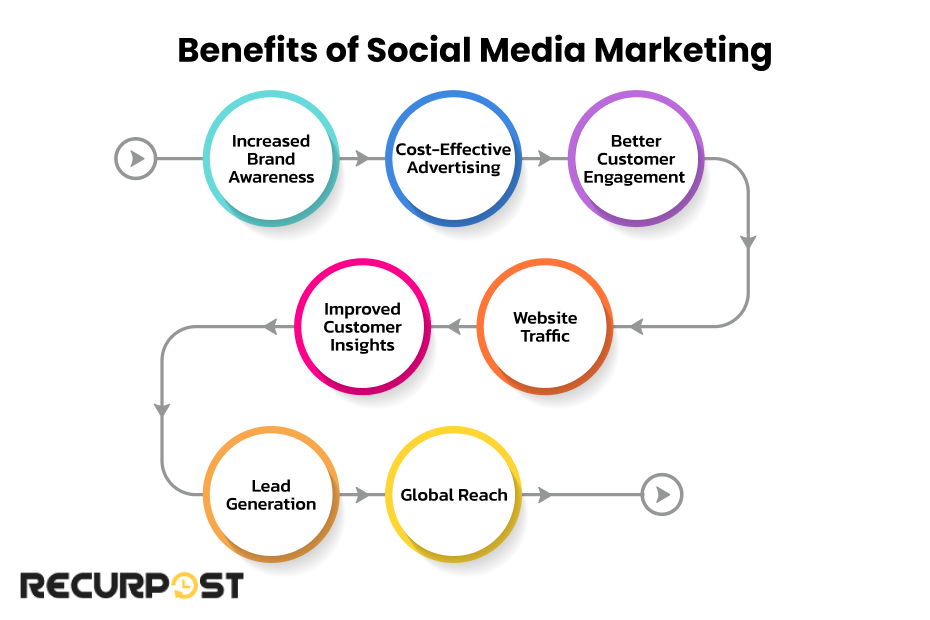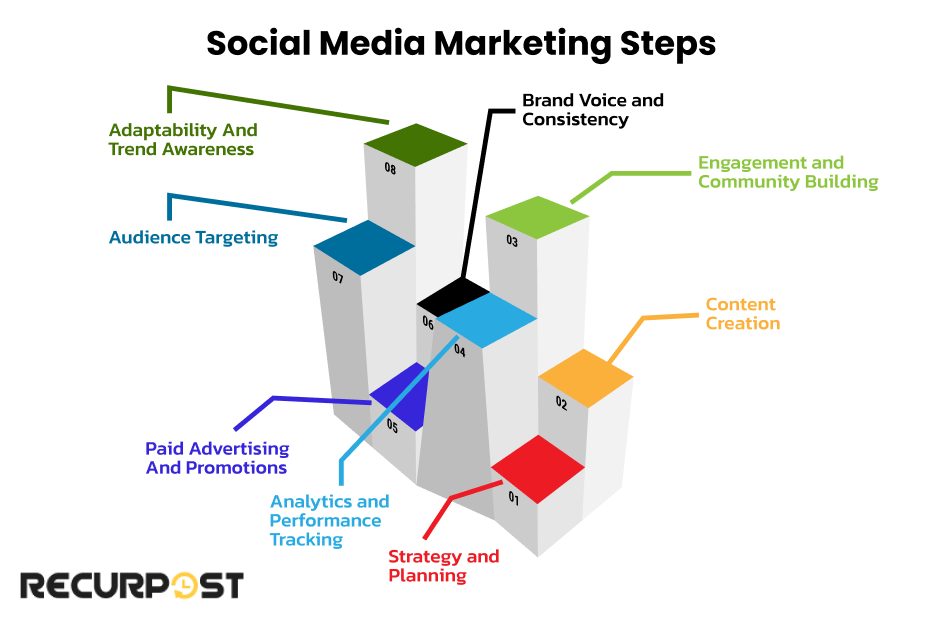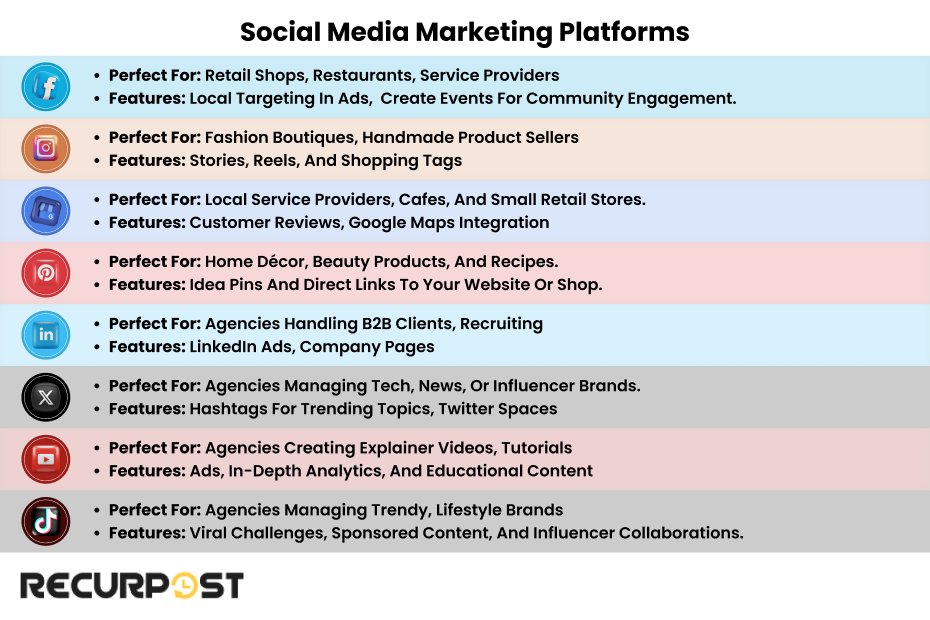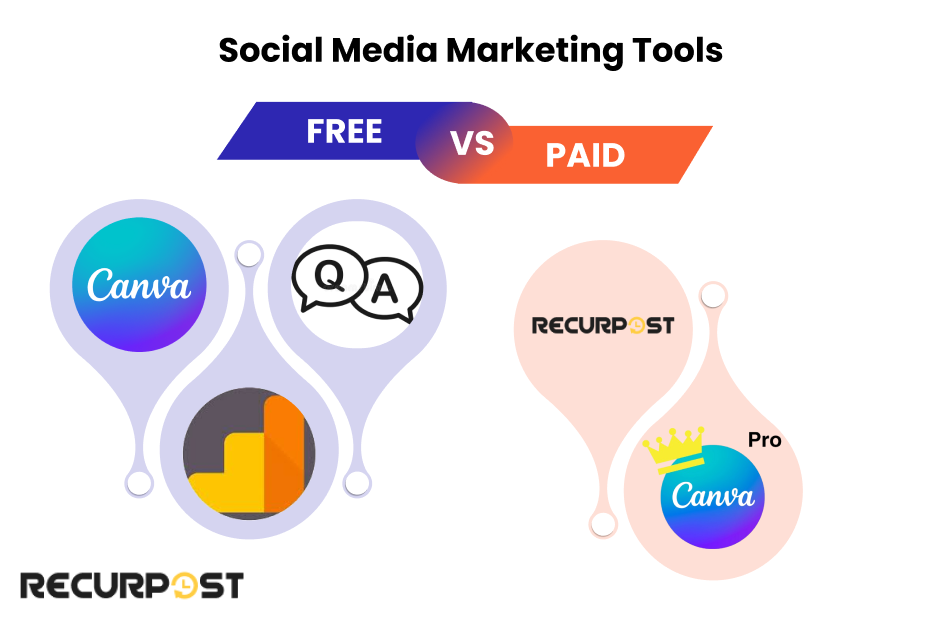If your business isn’t on social media, it’s missing out on the conversation. Social media marketing is now essential for building brand awareness, connecting with your audience, and driving real results. By tapping into platforms like Instagram, Facebook, and LinkedIn, businesses can tell their story, spark engagement, and grow their reach.
At its heart, social media marketing is a blend of strategy and creativity. It’s about more than just posting — it’s about creating real connections, earning trust, and delivering content that matters to your audience, right when they need it most.
Social Media Statistics
These are different social media statistics.
- On average internet users are spending around 2 hours and 30 minutes on social media each day.
- Age groups between 16-24 spent more time on social media.
- Females spent 10 minutes more than males on social media.
What is Social Media Marketing?
Social Media Marketing is the combination of strategies and social media marketing services to promote a brand online so it can achieve its specific marketing goals. It’s like having a friendly chat with your audience—posting updates, answering questions, sharing helpful or fun content, and ensuring your business stays in their minds.
Features of Social Media Marketing
Social media marketing comes with a variety of features that help to drive traffic to the target audience through social media posts. Some of the features include:
1. Profile Optimization: Make your social media profiles shine by using a clear profile picture, a catchy bio, and updated contact details. A well-optimized profile is like a personal data bank that can make lasting impressions.
2. Posting: Share valuable, entertaining, or informative content regularly. Consistent posting keeps your target audience engaged and reminds them of your presence. Remember, quality should be prioritized over quantity every time.
3. Engaging: Social media is a two-way process. Reply to comments, join conversations, and interact with your followers. It’s the secret source for building trust and loyalty.
4. Advertising: Boost your reach with targeted ads. Whether it’s promoting a post or running a campaign, advertising helps you reach the right people at the right time without much effort.
5. Measuring: Track how your content is performing using social media measurement analytics. From likes to conversions, measuring results helps you tweak your strategy and reach your goals.
6. Customer Support: Social media serves as a quick and efficient channel for addressing customer inquiries and resolving issues.
7. Scheduling and Automation: Social media marketing apps allow pre-scheduling posts to maintain consistency and save time.
8. Collaborations– Social media allows an opportunity to collaborate with the world-known influencers, famous brands, and others which is a need of the hour in marketing terms on social media.
Benefits of Social Media Marketing

Social media marketing is a search engine optimization method that helps to boost brand awareness of your products or services through means of online marketing campaign which is different from traditional marketing and the ultimate goal is to increase sales through social media posts, google ads, or by any other resourceful means. Some of the benefits include:
- Increased Brand Visibility – Social media platforms help you reach a larger audience, making your brand more visible.
- Builds Trust and Loyalty – Direct engagement like replying to comments, messages, and reviews—shows customers you value them. This builds trust, which leads to long-term loyalty.
- Cost-Effective Advertising – Posting on social media is free, and paid promotions allow targeted advertising within your budget.
- Better Customer Engagement – Engage directly with your target audience through comments, messages, and posts to build strong relationships.
- Boost Website Traffic – Sharing links to your website can drive more visitors and improve your search engine ranking.
- Improved Customer Insights – Social media analytics provide valuable data on audience preferences, helping you amend your strategies.
- Lead Generation – Social media platforms like Instagram and LinkedIn offer tools to capture leads and convert them into your customers.
- Global Reach – Social media breaks geographical barriers, allowing you to connect with audiences worldwide.
Best Practices of Social Media Marketing
Best practices of social media marketing in 2025 are built directly on the foundation from 2024 while adapting to rapid shifts in technology and user expectations. The cornerstone practices for effective social media marketing in 2025 include:
- Embrace Video Content – Balance short-form videos for brand awareness with long-form content for education and deep engagement.
- Develop Cultural Fluency – Stay aware of both global movements and micro-trends within target markets.
- Implement Platform-Specific Strategies – Tailor visuals, captions, and formats uniquely for each platform.
- Use AI Technologies – Apply AI for content creation, trend detection, social listening, and customer service.
- Personalize Content at Scale – Use AI-driven data to segment audiences and create tailored experiences.
- Build Engaged Communities – Foster micro-communities where brand advocacy grows through meaningful interactions.
- Form Authentic Influencer Partnerships – Focus on long-term collaborations with nano and micro-influencers.
- Optimize for Social Commerce – Streamline in-app purchasing with shoppable tags and video demonstrations.
- Practice Sustainability Marketing – Demonstrate genuine social responsibility efforts rather than performative activism.
Social Media Marketing Steps

Imagine these as the foundational blocks that form the base of social media marketing, just like the pillars that help the buildings stand in strength.
1. Strategy and Planning
Social media strategy definition and planning is the first step when you plan to venture into social media marketing. This acts like a GPS for social media marketing, which helps you to decide your final goal and the ways to reach there. Digital marketing service providers can use social media strategy presentations to discuss their plans with potential and existing clients.
2. Content Creation
This is the soul of your social media marketing. It includes engaging posts, videos, images, and infographics, content creation is a way to keep your audience interested.
3. Engagement and Community Building
Engagement and Community Building is the step that allows you to interact with your followers by replying to comments, joining discussions, and creating a sense of belonging for active participation. Building a community develops trust which is essential for success in the long run.
4. Analytics and Performance Tracking
By measuring likes, shares, clicks, and other metrics,, you can understand what’s working and what’s not. Use this feedback to refine your efforts and make proper decisions. This acts like a compass that helps you to be on the right track.
5. Paid Advertising and Promotions
Paid ads help you enhance your message and reach a larger, targeted audience. Whether it’s a sponsored post or a full-blown campaign, investing strategically can give you the boost you need.
6. Brand Voice and Consistency
Maintaining a consistent tone, style, and message across all posts creates a unique identity. This builds trust and makes your brand recognizable in the social media world.
7. Audience Targeting
Focus on the people who are most likely to benefit from what you offer. Prepare your content and ads to their interests, needs, and demographics for better results. Not everyone will like what you offer.
8. Adaptability and Trend Awareness
The current social media trends in social media are changing rapidly. Stay informed about changes in algorithms, user behavior, and industry trends. Being flexible and quick to adapt ensures your strategy stays fresh and relevant.
Don’t Miss This: How to Start a Social Media Campaign?- A Guide to Success
Social Media Marketing Platforms

Choosing the right social media marketing platforms depends on your goals and target audience. Small businesses and marketing agencies often have different social media marketing campaign needs. Based on these social media channels, small business owners and marketing agencies make their social media marketing strategies.
For Small Business Owners
Small business owners often focus on local visibility, building customer relationships, and increasing brand awareness as the best practices of social media marketing strategy. These platforms are ideal:
1. Facebook
Why It’s Great: With over 2 billion users, Facebook helps small businesses connect with local customers through pages, groups, and ads.
Best Features: Local targeting in ads, business page tools, and the ability to create events for community engagement.
Perfect For: Retail shops, restaurants, service providers, and community-focused businesses.
2. Instagram
Why It’s Great: Instagram is ideal for showcasing products and behind-the-scenes content.
Best Features: Stories, Reels, and shopping tags for direct product purchases.
Perfect For: Fashion boutiques, handmade product sellers, and food businesses.
3. Google My Business
Why It’s Great: Google Business Profile boosts your local search visibility and is essential for businesses relying on local customers.
Best Features: Customer reviews, Google Maps integration, and business info display on search.
Perfect For: Local service providers, cafes, and small retail stores.
4. Pinterest
Why It’s Great: Pinterest is a niche platform for visual storytelling and works well for businesses with creative or lifestyle products.
Best Features: Idea Pins and direct links to your website or shop.
Perfect For: Home décor, beauty products, and recipes.
Eager to learn how to promote your business on Instagram? Discover unique and effective social media promotional content ideas to get your brand in front of the right audience. Check out the blog now!
For Marketing Agencies
Marketing social media team structure focus on managing multiple client accounts, delivering ROI, and analyzing results. These platforms suit their needs:
1. LinkedIn
Why It’s Great: LinkedIn is perfect for B2B marketing and connecting with professional audiences.
Best Features: LinkedIn Ads, company pages, and the ability to target decision-makers.
Perfect For: Agencies handling B2B clients, recruiting, or thought leadership.
2. X (formerly Twitter)
Why It’s Great: X is ideal for real-time updates, networking, and keeping up with industry trends.
Best Features: Hashtags for trending topics, Twitter Spaces, and polls for engagement.
Perfect For: Agencies managing tech, news, or influencer brands.
3. YouTube
Why It’s Great: YouTube video content is a must for agencies aiming to drive engagement and conversions.
Best Features: Ads, in-depth analytics, and educational content creation opportunities.
Perfect For: Agencies creating explainer videos, tutorials, or influencer campaigns.
4. TikTok
Why It’s Great: Agencies can use TikTok to run campaigns for brands targeting Gen Z and millennials.
Best Features: Viral challenges, sponsored content, and influencer collaborations.
Perfect For: Agencies managing trendy, lifestyle, or fashion-forward brands.
Social Media Marketing Tools

Social media marketing resources or tools are those social media management software that are used to create engaging content. These tools are especially beneficial for small business owners and marketing agencies who are looking to venture into social media marketing. There are several organic (free) and paid tools that assist in managing social media marketing campaigns.
Free Social Media Marketing Tools
Free organic tools like these help businesses create schedules and analyze content without spending on expensive software. They are easy to use, effective, and support consistent growth in social media marketing efforts.
Using free tools for social media marketing can save costs and still deliver great results. Some of the organic tools are:
1. Canva
What It Does: Canva is a design tool that helps create stunning visuals for social media. From Instagram posts to LinkedIn banners, it offers templates for every platform.
Why It’s Useful: Even without design skills, anyone can create professional-looking graphics. You can customize templates by changing colors, fonts, and images to match your brand.
Best Features: Drag-and-drop functionality, thousands of free templates, and pre-sized dimensions for all social media platforms.
Perfect For: Creating engaging posts, stories, and infographics that stand out in your audience’s feed.
2. Google Analytics
What It Does: Google Analytics tracks traffic and engagement on your website, showing how your social media efforts are driving visitors.
Why It’s Useful: It provides insights into, which social platforms are bringing the most traffic and what content performs the best.
Best Features: Traffic sources breakdown, audience behavior analysis, and custom reports.
Perfect For: Measuring the effectiveness of social media campaigns and understanding your audience’s journey.
3. AnswerThePublic
What It Does: AnswerThePublic generates questions and topics that people are searching for online. It’s great for discovering content ideas that resonate with your audience.
Why It’s Useful: It helps you create relevant and engaging posts by addressing your audience’s real questions and interests.
Best Features: Visual topic maps, search query breakdowns, and content inspiration suitable to your niche.
Perfect For: Finding ideas for blog posts, videos, or social media content that align with what people are actively searching for.
Paid Social Media Marketing Tools
These tools don’t just save time; they improve the quality of your marketing efforts. By using paid tools you can manage your workflow, understand your audience better, and create content that engages. For effective social media marketing these tools are more beneficial than organic or free tools.
Some of the paid tools are:
1. RecurPost
RecurPost is a robust tool designed for scheduling and automating posts across various social media platforms.
Key Features:
Schedule posts for platforms like Facebook, Instagram, LinkedIn, Twitter, and Google My Business.
Create recurring content libraries for evergreen posts, saving time on reposting.
AI-powered post suggestions and analytics for better audience engagement.
Best For:
Small businesses, and agencies looking to manage multiple profiles with minimal effort.
Why it’s useful
It allows users to set up schedules that automatically rotate content, ensuring your posts stay relevant without needing constant manual input.
2. AdEspresso
AdEspresso is a powerful platform for managing and optimizing paid social media ads across Facebook, Instagram, and Google.
Key Features:
- You can choose to create campaigns on Facebook, or Instagram using AdEspresso’s intuitive campaign creation flow.
- With AdEspresso, you’ll get access to top-notch analytics tools to optimize your Facebook, and Instagram Ads campaigns after publishing.
- Analyze your social media campaigns and provide actionable daily in-app tips that allow you to pause underperforming ads.
Best For:
Small to Medium-sized businesses, E-commerce, and Agencies.
Why it’s useful
Its focus on testing and automation allows marketers to quickly refine their strategies, improving ROI without spending excessive time manually adjusting campaigns.
Bottom Line
The future of social media marketing lies in adapting to trends and making the most of tools like content planning apps designed for efficiency and growth. With different social media platforms hosting billions of monthly active users, opportunities for businesses to connect with their target audience are endless.
Social Media Marketing involves understanding how to effectively engage audiences across various platforms, combining organic strategies with paid social media management to maximize reach and drive meaningful results for businesses. When planning campaigns, considering factors like social media marketing pricing is also crucial for aligning strategies with business budgets. For social media marketers, tools like RecurPost simplify complex tasks, allowing them to focus on creative and data-driven strategies.
You may also read about how social media consulting firms can help elevate your online presence and increase social media engagement.
You may also read about how social media consulting firms can help elevate your online presence, improve social media metrics, and drive engagement.
Frequently Asked Questions
1. What is the difference between social media marketing and social media advertising?
Social media marketing focuses on building a strong presence across social media platforms through organic strategies like engaging content, community interaction, and analytics.
Social media advertising involves paid promotions, like Google Ads or sponsored posts, to reach a relevant audience quickly.
2. Is it feasible to implement social media marketing for small business owners and marketing agencies?
Yes, it’s highly feasible. Small businesses can use social media channels like Facebook or Instagram to increase brand awareness, while marketing agencies can handle multiple platforms using social media management software to create impactful marketing campaigns for their clients.
3. What are the social media marketing courses that can be enrolled in to understand it?
Courses like HubSpot’s Social Media Marketing Certification, Hootsuite Academy’s Course, and LinkedIn Learning offer valuable insights into social media strategies, content creation, and audience demographics to help achieve business goals.
4. What is the role of a social media manager in social media marketing?
A social media manager handles the day-to-day activities of managing social media networks. This includes planning a social strategy, scheduling posts, engaging with potential customers, analyzing user behavior, and ensuring the marketing goals align with the brand’s identity and objectives.
5. What is the minimum budget required to start social media marketing?
The minimum budget to start marketing in the USA is around $100–$300 per month. This can cover basic social media ads cost, combined with free tools for content creation and organic posting strategies.

Shubham Agrawal is a passionate content writer, with over a year of experience in this field. He excels in creating content in informative and creative way that aligns with readers. He juggle with words to create an engaging content.
